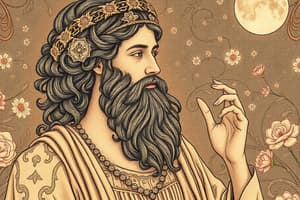Podcast
Questions and Answers
How does Descartes distinguish the soul from the body?
How does Descartes distinguish the soul from the body?
- The soul is a material, mortal being.
- The body is capable of thought and understanding.
- The body is a conscious entity governed by physical laws.
- The soul is an independent, non-material conscious being. (correct)
What concept did John Locke introduce regarding human knowledge at birth?
What concept did John Locke introduce regarding human knowledge at birth?
- Human knowledge stems primarily from reason.
- Knowledge is purely a collection of memories.
- Human knowledge is innate and unchanging.
- Humans are born with a 'Tabula Rasa' or blank slate. (correct)
According to David Hume, what is the 'self' fundamentally seen as?
According to David Hume, what is the 'self' fundamentally seen as?
- An unchanging, permanent essence.
- A singular, conscious entity.
- A collection of various perceptions. (correct)
- An intricate set of moral judgments.
What does Kant suggest about the role of the self in knowledge acquisition?
What does Kant suggest about the role of the self in knowledge acquisition?
What does the Bundle Theory propose regarding impressions and ideas?
What does the Bundle Theory propose regarding impressions and ideas?
What does Plato's Theory of Forms suggest about the physical world?
What does Plato's Theory of Forms suggest about the physical world?
What is the main assertion of John Locke's theory of personal identity?
What is the main assertion of John Locke's theory of personal identity?
According to Plato, which part of the soul is driven by basic needs?
According to Plato, which part of the soul is driven by basic needs?
How did St. Augustine view the nature of human beings?
How did St. Augustine view the nature of human beings?
Which philosopher stated that knowledge does not only come from sense experience?
Which philosopher stated that knowledge does not only come from sense experience?
How does Descartes view the relationship between the soul and physical laws?
How does Descartes view the relationship between the soul and physical laws?
What is the main assertion of Descartes regarding the self?
What is the main assertion of Descartes regarding the self?
What does 'Cognito Ergo Sum' mean in Descartes' philosophy?
What does 'Cognito Ergo Sum' mean in Descartes' philosophy?
Which aspect of St. Augustine's view on the self emphasizes personal awareness?
Which aspect of St. Augustine's view on the self emphasizes personal awareness?
What motivates the emotional and passionate part of Plato's concept of the soul?
What motivates the emotional and passionate part of Plato's concept of the soul?
What is the belief shared by both Plato and St. Augustine about the soul?
What is the belief shared by both Plato and St. Augustine about the soul?
What does Gilbert Ryle imply about the self?
What does Gilbert Ryle imply about the self?
What is a category mistake according to Paul Churchland?
What is a category mistake according to Paul Churchland?
Which statement reflects Paul Churchland's view on the self?
Which statement reflects Paul Churchland's view on the self?
What concept does Maurice Merleau-Ponty strongly associate with consciousness?
What concept does Maurice Merleau-Ponty strongly associate with consciousness?
What distinguishes the subjective body from the objective body according to Merleau-Ponty's philosophy?
What distinguishes the subjective body from the objective body according to Merleau-Ponty's philosophy?
Which framework does Churchland advocate for as a more accurate reflection of the human mind?
Which framework does Churchland advocate for as a more accurate reflection of the human mind?
What is the primary goal of phenomenology as described by Merleau-Ponty?
What is the primary goal of phenomenology as described by Merleau-Ponty?
Which philosophical stance contrasts with the behavioristic view of the self?
Which philosophical stance contrasts with the behavioristic view of the self?
What is the significance of self-knowledge according to philosophical perspectives?
What is the significance of self-knowledge according to philosophical perspectives?
Which philosophical orientation emphasizes knowledge through sensory perception?
Which philosophical orientation emphasizes knowledge through sensory perception?
In Socratic philosophy, what is considered the real self?
In Socratic philosophy, what is considered the real self?
What does Socrates imply about living an examined life?
What does Socrates imply about living an examined life?
Which of the following definitions best describes philosophy?
Which of the following definitions best describes philosophy?
What does the concept of 'body + soul = man' signify?
What does the concept of 'body + soul = man' signify?
How does pragmatism approach knowledge and reality?
How does pragmatism approach knowledge and reality?
Which aspect of self is emphasized in Socratic philosophy?
Which aspect of self is emphasized in Socratic philosophy?
Flashcards are hidden until you start studying
Study Notes
Lesson Objectives
- Recognize the importance of philosophy in self-understanding.
- Explore various philosophical concepts of the self.
- Assess how philosophical views shape the youth's identity.
Philosophy Defined
- Philosophy derives from Greek words: "Philo" (love) and "Sophia" (wisdom).
- It investigates fundamental aspects of knowledge, reality, and existence.
- Self-knowledge is deemed essential for a fulfilling life.
Philosophical Orientations
- Rationalism: Knowledge through logic and reasoning.
- Empiricism: Knowledge through sensory experience and experimentation.
- Realism: The belief in an objective reality independent of perceptions.
- Pragmatism: Focus on practical outcomes, valuing usefulness over strict doctrines.
The Philosophy of the Self
- The self is a unified entity associated with consciousness and agency.
- Meaning of the self has evolved from abstract concepts to evidence-backed interpretations.
Socrates
- Greek philosopher known primarily through Plato and Xenophon.
- Identified the self with the psyche (or soul), distinguishing it from the physical body.
- Emphasized self-awareness: "An unexamined life is not worth living."
- Asserted that virtue and self-knowledge are fundamental to a meaningful life.
Plato
- Socrates' student who introduced the Theory of Forms, asserting an ultimate reality beyond the physical.
- Described the soul as immortal and composed of three parts:
- Appetitive: Basic desires.
- Spirit/Passion: Emotional drives.
- Reason: The rational aspect seeking truth.
St. Augustine
- Christian philosopher who integrated Platonic ideas with Christian doctrine.
- Believed humans are made in God's image; self-awareness is crucial for virtue.
- Stressed that knowledge arises from within, through introspection.
René Descartes
- French philosopher and considered the father of modern philosophy.
- Famous for "Cognito Ergo Sum" ("I think, therefore I am"), suggesting self-awareness proves existence.
- Distinguished between the soul (immaterial) and body (material), asserting that the soul is the core of identity.
John Locke
- English philosopher who viewed the mind as a "Tabula Rasa" (blank slate) at birth.
- Argued personal identity arises from memory and experiences, emphasizing the construction of self through sensory input.
David Hume
- Focused on introspection and concluded that what we call 'self' is merely a collection of perceptions.
- Developed Bundle Theory, asserting the self consists of a series of fleeting impressions rather than a single entity.
Immanuel Kant
- Proposed that the self organizes sensations into coherent experiences, linking empirical data with rational thought.
- Introduced a transcendental view, considering self-awareness as both internal reflection and acknowledgment of self from external action.
Gilbert Ryle
- Argued that the self is demonstrated through behavior rather than an abstract concept.
- Introduced the category mistake, critiquing misconceptions in describing the nature of self.
Paul Churchland
- Advocated for the view that the self is entirely based within the physical brain.
- Proposed eliminative materialism—arguing for neuroscience as the accurate representation of human thought and mental processes.
Maurice Merleau-Ponty
- Key figure in phenomenology, emphasizing awareness through consciousness.
- Differentiated between subjective and objective understanding of the body, asserting that bodily existence is intrinsic to self-awareness.
Reflective Question
- Personal identity theories challenge one’s understanding; which philosophical view resonates with individual perceptions of self?
Studying That Suits You
Use AI to generate personalized quizzes and flashcards to suit your learning preferences.




